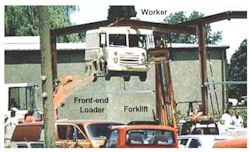Operating the Forklift
Age Requirements
Operating a forklift is a safety-critical task that requires specialized skills and knowledge. To ensure safe operation and compliance with regulations, individuals must be properly trained, evaluated, and authorized before driving a forklift.
To protect young workers from hazardous employment, the Fair Labor Standards Act (FLSA) 29 CFR 570.120, Eighteen-year Minimum, provides for a minimum age of 18 years in occupations found and declared to be particularly hazardous or detrimental to the health or well-being for minors.
Training Requirements
Certification: The employer must certify that all employees are trained, evaluated, and certified as qualified on the specific forklift being operated before being assigned to use a forklift.
- Only trained and certified operators are authorized to drive a forklift. Certification must meet OSHA standard 29 CFR 1910.178(3) requirements in the United States.
- Operators must complete formal instruction (e.g., lectures, videos, written materials) and practical, hands-on training under the supervision of a qualified trainer.
- Operators must pass an evaluation of their performance in the workplace, conducted by a qualified person before being authorized to operate a forklift independently.
Training and Certification Details
Certification involves completing formal instruction, hands-on training, and a performance evaluation under the supervision of a qualified trainer. Only those who successfully meet all training and evaluation requirements — and are authorized by their employer — are permitted to operate forklifts in the workplace.
- Training must cover forklift operation, load handling, hazard recognition, and safe driving practices specific to the type of forklift and the environment in which it will be used (e.g., warehouse, construction site).
- Certification must include the name of the operator, the date of training and evaluation, and the identity of the person(s) performing the training and evaluation.
- Employers are responsible for ensuring operators receive training and certification before assigning them to operate powered industrial trucks (forklifts).
Forklift operators must receive initial training that covers both truck-related topics and workplace-related topics to ensure safe operation. Training must address areas such as operating instructions, differences between forklifts and automobiles, controls and instrumentation, engine operation, visibility challenges, load handling, vehicle stability, inspection and maintenance tasks, refueling procedures, and operating limitations.
Operators must also be trained on workplace-specific hazards, including surface conditions, load composition and stability, pedestrian traffic, narrow aisles, hazardous locations, ramps, ventilation concerns, and any other environmental risks unique to the site. In addition, training must include instruction on the regulatory requirements outlined in OSHA’s forklift standard.
Employers may exclude topics only if they can demonstrate that the topic is not relevant to safe forklift operation in their specific workplace. If an operator has previously received training in a topic, and such training is appropriate to the truck and working conditions encountered, additional training in that topic is not required if the operator has been evaluated and found competent to operate the truck safely.
Refresher Training and Re-Evaluation
Refresher training is required when an operator is observed operating unsafely, is involved in an accident or near-miss, receives an unsatisfactory evaluation, is assigned to a different type of truck, or when workplace conditions change affecting safe operation.
Every forklift operator must be evaluated at least once every three years to confirm continued safe performance.
Knowledge Check Choose the best answer for the question.
3-1. What is the minimum age that employees may be certified to operate forklifts in occupations found to be hazardous for minors?
You forgot to answer the question!

